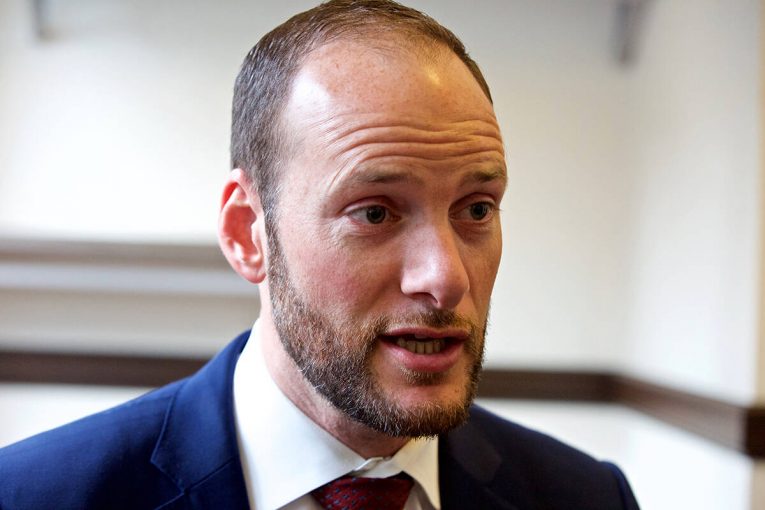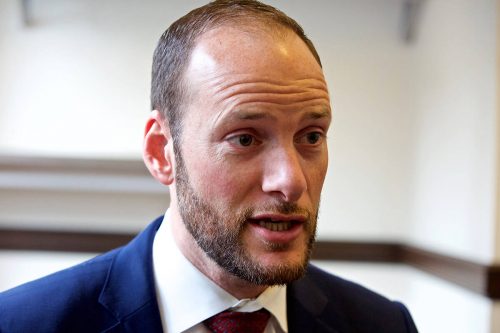

By Alex Jimenez
SAN FRANCISCO, CA – “Safer SF Without Boudin,” the campaign that initiated the June recall election of San Francisco District Attorney Chesa Boudin, recently released a 30-second commercial blasting Boudin’s handling of drug related cases.
“There’s just one problem,” writes Eric Ting of the SF GATE, noting in his article the recall campaign’s efforts to mislead the public, specifically the new ad.
The commercial begins: “I had to close my business after 20 years because of constant drug dealers in front of my shop,” says Max Young, the former owner of mid-Market area nightclub and cocktail lounge Mr. Smith’s, adding, “Even when they were arrested, they’d be right back here.”
After Young speaks, recall organizer Tom Wolf appears in the ad stating, “Chesa Boudin has allowed it to become a free-for-all, and at some point, you have to draw the line and say, ‘Enough, you will be held accountable.’”
A message repeatedly blamed Boudin for the “open air drug market” in the Tenderloin.
The one problem about the ad, said writer Ting, is that Young closed Mr. Smith’s in September 2019, and Boudin was not elected until November 2019 and assumed office in January 2020.
“The ad is clearly a lie,” Julie Edwards, a spokesperson for the committee supporting Boudin, said in a statement.
“First. it falsely implies DA Boudin is responsible for the closure of a business that happened before he was even elected. That’s obviously intentionally misleading—which the recall knows and is refusing to correct. Second, it’s irresponsible to blame a DA for a public health crisis when prosecutors do not have any control over citywide public health responses,” Edwards added.
Despite this discrepancy, the recall campaign said it stands by the ad even though neither Safer SF nor Young ever disputed that the nightclub closed before Boudin took office according to the Examiner.
Neither of them directly responded to the ad being characterized as misleading but contend that Boudin has made the existing drug issue worse.
“The DA has openly said that prosecuting drug dealers is not a priority for him,” Young said in a statement. “As a result, he’s hurting small businesses and putting San Francisco’s residents and visitors at a consistent, higher risk of crime and violence, especially those who live in the TL, which is filled with families, the elderly, people on government assistance, immigrants and people in recovery.”
According to Safer SF chair Mary Jung, Boudin has refused to take “meaningful action,” to address the drug crises, charging, “His lack of action is hurting small businesses and putting residents and visitors at risk.”
Jung said conviction rates for drug related cases have decreased under Boudin but rates for diversion to substance and mental health programs have increased.
Boudin supporters, comparing Boudin to the previous DA, said that in 2019 then-DA George Gascón’s office convicted 52.2 percent of narcotic related cases with a 23.9 percent diversion rate.
The DA’s supporters said, during Boudin’s two full years in office (2020 and 2021), there was a conviction rate of 35.5 percent and 30.5 percent for drug cases and diversion rates of 27.5 percent and 33.7 percent respectively.
Boudin, they said, has been a huge advocate for diversion programs, arguing that they lead to lower recidivism rates than conviction and incarceration.
A California Policy Lab report for 2021 concluded that individuals who went through diversion programs were 10 percent less likely less likely to be arrested for drug possession and 28 percent less likely to be arrested for drug sales after one year, compared to individuals placed in incarceration or convicted.
“Finally, the ad completely ignores the work DA Boudin has done to hold drug dealers accountable and to stop overdose deaths,” Edwards said. “It ignores his push for the creation of a fentanyl task force to fund new prosecutors and investigators focusing solely on narcotics cases (this funding was denied by the city).”
“It ignores his office’s prosecution of over 1,000 cases for drug sales or intent to sell (a filling rate of well over 80 percent, which is higher than his predecessor), Edwards said.
Edwards told both Ting and the Vanguard that the recall campaign continuously misleads voters either through ads or their messaging.
“All of their messaging is misleading, starting with the premise that a recall will make San Franciscans safer. In fact, recalls distract from the hard work that needs to be done to improve public safety and reduce crime.” stated Edwards to the Vanguard.
She further provided other examples of disproven claims made by Safer SF. Regarding a claim that Boudin only prosecutes 14 percent of domestic violence cases is a cherry-picked statement from a single quarter in 2020 (during the height of delta virus), Edwards said.
She added the actual overall prosecution rate for DV cases is 30.31 percent. In 2021, the rate was 36.71 percent; in 2022 so far it’s been 45.64 percent, according to DA Data Dashboard.
Edwards pointed out a false claim that the recall is supported by SF Democrats—the San Francisco Democratic County Central Committee voted 20-2 to oppose the recall.
Meanwhile, the anti-Boudin campaign also advertised on TV, “Home and car break-ins are on the rise because repeat offenders now can get away with it.”
But Edwards notes prosecution rates for auto burglaries were higher in 2021 and 2022 (67.3 percent) than 2011- 2019 (63.35 percent). Rates for home burglaries were 69.6 percent in 2021 and 2022 compared with 68.77 percent from 2011 to 2019.
Safer SF Without Boudin did not respond for comment.
The Boudin recall election will appear on the June 7 ballot for San Francisco voters under Proposition H.

